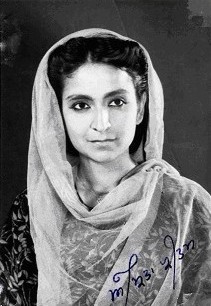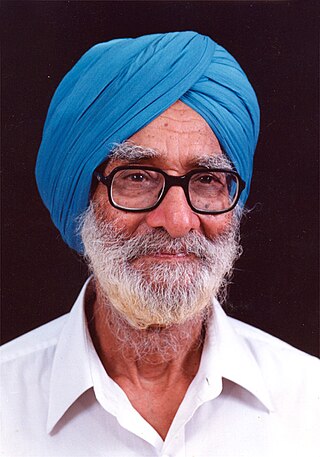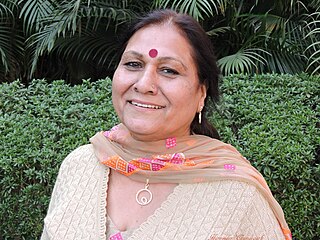
Amrita Pritam was an Indian novelist, essayist and poet, who wrote in Punjabi and Hindi. A prominent figure in Punjabi literature, she is the recipient of the 1956 Sahitya Akademi Award. Her body of work comprised over 100 books of poetry, fiction, biographies, essays, a collection of Punjabi folk songs and an autobiography that were all translated into several Indian and foreign languages.

Surinder Kaur was an Indian singer and songwriter. While she mainly sang Punjabi folk songs, where she is credited for pioneering and popularising the genre, Kaur also recorded songs as a playback singer for Hindi films between 1948 and 1952. For her contributions to Punjabi music, she earned the sobriquet Nightingale of Punjab, the Sangeet Natak Akademi Award in 1984, and the Padma Shri in 2006.

Giani Gurdit Singh was born in Mithewal village in the state of Punjab, India. He was considered one of the greatest contemporary writers in Punjabi, and his book Mera Pind is regarded as a classic. It is now in its 14th edition and has been in print continuously since 1961. He was also a pioneering journalist, the Owner-Editor of Parkash 1947–1978. He was also the editor of Singh Sabha Patrika, a monthly magazine of Sikh history and divinity. Giani Gurdit Singh graduated as "Giani" from Punjab University, Lahore in 1945, and he specialised in literature, divinity, history and folklore. He was a member of the Punjab Legislative Council from 1956 to 1962. He contributed to the debates at that time and in the creation of Punjabi University, Patiala and the recognition of Takht Sri Damdama Sahib, Talwandi Sabo, as the 5th Takht of the Sikhs. He was General Secretary of the Singh Sabha Shatabadi Committee, Amritsar, renamed Kendriya Sri Guru Singh Sabha. As the editor of the magazine Singh Sabha Patrika, he focused on issues of importance to the Sikhs. He also established two Guru Granth Vidya Kendras, one in Chandigarh and another in Mehrauli, Delhi.
Punjabi folklore, more particularly its folksongs, are a core part of the Punjabi culture. Other important components of Punjabi folklore are farces, anecdotes, idioms, folktales, and sayings.

Surjit Patar is a Punjabi language writer and poet of Punjab, India. His poems enjoy immense popularity with the general public and have won high acclaim from critics.
Punjabi literature, specifically literary works written in the Punjabi language, is characteristic of the historical Punjab of present-day Pakistan and India and the Punjabi diaspora. The Punjabi language is written in several scripts, of which the Shahmukhi and Gurmukhī scripts are the most commonly used in Western Punjab and Eastern Punjab, respectively.

Puran Bhagat was a Punjabi Nath saint, prince of Sialkot, and disciple of Machchandranath as per Punjabi folklore. According to unauthenticated history, he had been exiled and lived the last days of his life in a village located in the suburbs of Sialkot city. His temple and water well is still open for visitors and devotees.

Mohan Singh (1905–1978) was a noted Indian poet in the Punjabi language and an academic, and one of the early pioneers of modern Punjabi poetry.
Nand Lal Noorpuri was an Indian poet, writer and lyricist who wrote in Punjabi. He wrote lyrics for many films including Mangti. He died by suicide on 13 May 1966.
Mangal Sen (1915–1972) was a Punjabi writer, poet and essayist in East Punjab, India. He wrote first under the name Balwant Rai, but is most famous for his poetry under his pen name Bawa Balwant. He started writing poetry in Urdu but later switched to his mother tongue of Punjabi. Balwant is credited with helping start the progressive movement in Punjabi poetry. He also made a contribution to the freedom struggle of India.
Santokh Singh Dhir was an Indian writer and poet who wrote in Punjabi. He was known for his stories Koee Ik Sawaar, Sanjhi Kandh and Saver Hon Tak. He was awarded the Sahitya Akademi Award for his story collection Pakhi (1991) in 1996 by the Government of India. He died on 8 February 2010.
Jaswant Singh Rahi was a Punjabi poet, writer, communist and freedom fighter. He was born in and lived his whole life in Dera Baba Nanak town of Gurdaspur district of Punjab, India. Columnist Joginder Singh Bedi stated, "Born in the holy town of Dera Baba Nanak in Gurdaspur district, the Sahit Shiromani Poet Jaswant Singh Rahi's contribution to Punjabi world of letters is no less than that of Dhani Ram Chatrik, Prof Mohan Singh (poet) and Prof Puran Singh. Rahi is popularly known for his slogan Jai Mitarta."
Shiv Singh was an Indian-Punjabi artist, known mainly for his work as a sculptor.

Rana Ranbir Singh is an Indian Punjabi actor working in Punjabi cinema and Hindi cinema.

Dr. Harcharan Singh (1914–2006) was an Indian dramatist and writer in the Punjabi language. He dedicated 69 years of his life to Punjabi theater, in which he authored 51 books and staged numerous plays all over the world.

Atul Sharma is a multiple-award-winning music composer, producer, sitarist, singer and judge on the popular TV show "Voice of Punjab". He is known for being one of the pioneers of Bhangra and Punjabi pop/folk music, and has composed music for over 5000 music albums and many Punjabi and Hindi films. He has given many global hits like "Yaar Bolda", "Dupatta Tera Satt Rang Da", "Mukhda Dekh ke", "Jatti", "Mitraan Da Naa Chalda" etc. He has also composed and designed music for various theatre productions and has worked with eminent directors and play writes. Based out of Chandigarh, he has been one of the foremost contributors in setting up the Punjabi music industry, and the emergence of recording studios in North India.
Loona (Lūṇā) is a Punjabi epic verse play written by Shiv Kumar Batalvi. Based on the ancient legend of Puran Bhagat, this epic was bestowed with prestigious Sahitya Akademi Award in 1967, given by Sahitya Akademi. Shiv became the youngest recipient of this prestigious award.

Manjit Indira is an Indian poet and writer of Punjabi descent. Her first book Antahkaran was published in 1974.

Gurshaahi is a Punjabi web portal owned by the Gurshaahi Foundation, a nonprofit and non-governmental organization dedicated to the promotion of the Punjabi literature across the world. It has digitalized about 1500 punjabi poetry excerpts of prominent writers from Indian Punjab and Pakistani Punjab. It serves content in multiple scripts such as Gurmukhi, Shahmukhi and Roman. It also includes forgotten poetries from poets, including Baba Farid, Bulle Shah,Shah Hussain,Waris Shah,Shiv Kumar Batalvi and many others. Furthermore, it hosts shayari from centuries earlier and is taking a great step forward for the preservation of Punjabi literature. The Instagram portal has digitalized more than 1500 verses which are categorically classified into different sections such as Char'da Punjab, Lahnda Punjab, Interviews, Quiz and translated work. It is also credited for preserving ghazals, couplets, nazms and 100+ literary videos. Gurshaahi also started its podcasts on Apple Podcast and Spotify.

Swarajbir Singh is an Indian Punjabi playwright, poet, administrator, and editor. He received the Sahitya Akademi Award for his play Masia di Rāt (2016)














